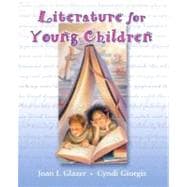
Note: Supplemental materials are not guaranteed with Rental or Used book purchases.
Purchase Benefits
What is included with this book?
| Defining Literature for Children | |
| Evaluating Literature for Children | |
| Sharing Literature | |
| The Literature Curriculum | |
| Supporting Children's Language Development | |
| Supporting Children's Intellectual Development | |
| Supporting Children's Personality Development | |
| Supporting Children's Social and Moral Development | |
| Supporting Children's Aesthetic and Creative Development | |
| Planning Your Program | |
| Appendix | |
| Author/Illustrator/Title Index | |
| Subject Index | |
| About the Author | |
| Table of Contents provided by Publisher. All Rights Reserved. |
The New copy of this book will include any supplemental materials advertised. Please check the title of the book to determine if it should include any access cards, study guides, lab manuals, CDs, etc.
The Used, Rental and eBook copies of this book are not guaranteed to include any supplemental materials. Typically, only the book itself is included. This is true even if the title states it includes any access cards, study guides, lab manuals, CDs, etc.